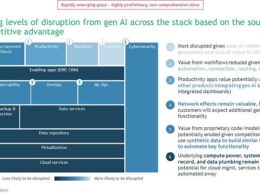health strategy institute — for economic prosperity
the most compreehensive knowledge portal
for continuous health transformation
and digital health
Joaquim Cardoso MSc.
Chief Research and Strategy Officer (CRSO),
Chief Editor and Senior Advisor
December 30, 2023
This is an Executive Summary of the article “The Coming AI Economic Revolution- Can Artificial Intelligence Reverse the Productivity Slowdown?”, written By James Manyika and Michael Spence, and Published on October 24, 2023, in Foreign Affairs.
What is the message?
- the transformative potential of Generative AI to bolster productivity and economic growth is immense.
- However, to reap its full benefits, concerted efforts from governments, businesses, and researchers are necessary.
- Policies must aim to strike a balance between preventing potential harms and maximizing AI’s positive impact on the economy, workforce, and society.
- Failure to effectively guide AI innovations could exacerbate existing economic disparities rather than propel global economic strength for future generations.
This executive summary outlines the imminent transformative impact of Artificial Intelligence (AI) on the global economy.
McKinsey Global Institute’s study estimates that generative AI could contribute over $4 trillion annually, augmenting the $11 trillion from other AI and automation technologies. Despite potential hurdles, the revolutionary impact will largely stem from productivity gains.
The impending AI-driven shift could significantly enhance global prosperity, potentially reversing declining productivity growth in advanced economies.However, realizing this potential necessitates proactive policies and a mindset shift toward AI. Policies should prioritize augmenting human capabilities, fostering widespread AI adoption across sectors, and driving organizational innovations to effectively leverage AI’s potential.
The global economy faces challenges such as slowing growth, reduced labor supply, inflation battles, and supply-side constraints. Aging populations, labor shortages, changing job preferences, geopolitical tensions, climate change, and pandemic shocks compound these issues, demanding a powerful productivity-boosting force. AI stands as a pivotal solution, capable of revitalizing growth by mitigating supply-side constraints.
Unlike past digital innovations, the AI revolution extends beyond codifiable work, leveraging breakthroughs in machine learning and pattern recognition to perform complex non-codifiable tasks. Generative AI, based on large language models (LLMs) and Transformers, has expanded capabilities, predicting protein structures, enabling multilingual translations, and fostering breakthroughs across scientific fields. LLMs, trained on massive datasets, demonstrate human-like responses across diverse knowledge domains.
The AI economic revolution holds immense promise, poised to significantly augment global productivity.
However, realizing its full potential requires strategic policy interventions, a shift in mindset toward AI as a tool for enhancing human potential, and widespread adoption across industries to harness its transformative power.
The ongoing integration of generative AI as a versatile, general-purpose technology signifies a paradigm shift in the global economy, presenting both challenges and unprecedented opportunities for innovation and growth.
There is a high potential form economic impact and implications of Generative AI technology.
This revolutionary tool demonstrates exceptional versatility, as Large Language Models (LLMs) can effortlessly respond to prompts across various domains — ranging from science to law — without explicit instructions. Moreover, these models, equipped to handle different inputs like text, code, audio, images, and video, showcase multimodal capabilities, offering a broad platform adaptable to numerous specific uses. The widespread accessibility of LLMs, evidenced by the enormous user traffic on platforms like ChatGPT, indicates a low barrier to entry and widespread interest in this technology.
Predicting the precise future applications of LLMs remains challenging. However, ongoing rapid technical innovations, substantial venture capital investments, and the continuous evolution of these models suggest inevitable capability growth. Over the next few years, thousands of applications leveraging LLMs and other Generative AI models will emerge, catering to diverse sectors, activities, and job roles. These applications, if effectively implemented across various economic sectors, are anticipated to drive a substantial and prolonged surge in productivity and overall economic performance.
Studies on AI’s impact, such as the examination of an AI digital assistant for customer service representatives in the tech sector, highlight significant productivity gains. The study showed an average 14% productivity increase with the AI assistant, particularly benefiting inexperienced agents, indicating the potential for accelerated on-the-job training facilitated by Generative AI.
The study showed an average 14% productivity increase with the AI assistant, particularly benefiting inexperienced agents, indicating the potential for accelerated on-the-job training facilitated by Generative AI.
Likewise, AI-driven tools like digital mapping apps have leveled the playing field for London taxi drivers, reducing the time required to acquire expertise. Such technology-enhanced performance improvements are likely to become commonplace across diverse sectors, boosting efficiency and productivity.
The scope of Generative AI extends to numerous tasks, from media content creation to software development, potentially accelerating the pace of research and innovation across various professions. Additionally, its application in ambient intelligence systems within sectors like healthcare could significantly reduce administrative burdens, potentially enhancing efficiency and transparency.
Despite the promising prospects, concerns persist around AI’s reliability, potential job displacement, and the accuracy of its outputs. Issues such as biases in training data, erroneous or hallucinated outputs, and the overreliance on AI systems without human oversight need addressing. Additionally, the impact of AI on jobs is not solely displacement; instead, it often augments human capabilities, reshaping job roles and requiring new skill sets.
To harness AI’s potential for inclusive and sustainable economic growth, a proactive policy approach is imperative. Policymakers must prioritize augmenting human skills over complete automation, ensure widespread diffusion of AI technologies, and address workforce transitions, potentially providing income support and fostering skill development.
The uneven adoption of AI technologies across sectors, firms, and countries poses challenges, necessitating policies that encourage broad diffusion and equitable access to AI advancements. Effective international economic governance is crucial to ensure equitable global access to AI technologies.












